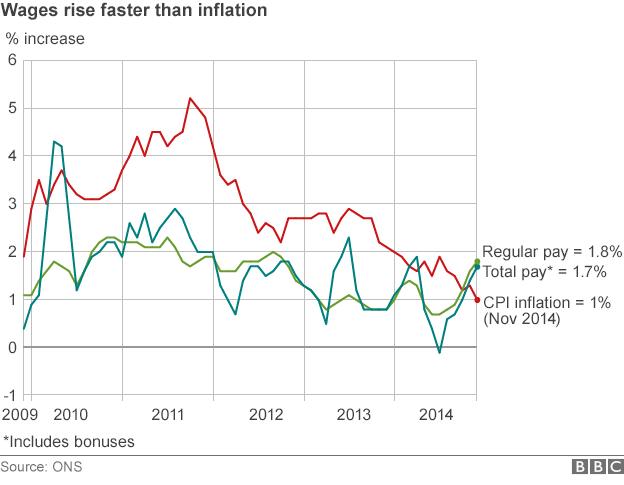UK unemployment falls to 1.9 million
- Published
Nick Palmer, ONS: "Unemployment continues to fall"
The number of people out of work in the UK fell by 58,000 to 1.91 million, its lowest level for more than six years, in the three months to November, official figures indicate.
The unemployment rate now stands at 5.8% of the adult working population, the Office for National Statistics (ONS) said., external
In total, there are now 30.8 million people in work.
The ONS said wage growth had also continued to outpace inflation.
In the September to November period, average earnings excluding bonuses were up 1.8% from a year earlier. Including bonuses, earnings rose by 1.7%.
It is the second consecutive month that both measures of earnings growth have been above the inflation rate.
Inflation, as measured by the consumer price index, stood at 1% in November and then fell to 0.5% in December as global oil prices tumbled further.

The number of people claiming Jobseeker's Allowance in December fell by 29,700 to 867,000, the 26th consecutive monthly reduction, said the ONS.
The ONS figures, external showed the east of England and the south-east (76.6%) had the highest rate of employment, whiles Wales (68.7%) had the lowest.
The unemployment rate was highest in the north-east of England (8.5%) and lowest in the south-west (4.4%), the ONS said.
Slowing growth
However, there were signs that growth in employment is easing, with the fall in unemployment its smallest since the three months to September 2013.
The number of jobless 16 to 24-year-olds also increased by 30,000 to 764,000 - the first quarterly rise since June to August 2013.
David Kern, chief economist at the British Chambers of Commerce, said the figures suggested the UK economy might be gradually slowing.
"The modest upturn in average earnings growth is a positive development. However, wage growth will only be sustainable if it is matched by increased productivity. The focus of economic policy must remain on sustaining and improving economic growth," he added.
Howard Archer, chief European and UK economist at IHS Global Insight, said the rate of improvement could have now peaked.
"We expect unemployment to fall appreciably further during 2015, but likely at a modestly reduced rate compared to the overall drop seen in 2014," he said.
Work and Pensions Secretary Iain Duncan Smith said the latest figures were a positive sign for the economy.
Songwriter Sherika Sherard, 23, wrote Give Me A Job, in an effort to get work
"We now have unemployment falling below 6% for the first time, which is a really, really important moment to mark. Jobs are being created and salaries are rising, meaning that increasing numbers of people are feeling the security and hope for the future," he added.
However, Business Secretary Vince Cable warned there was "more to be done".
"Youth unemployment remains too high. That is why we will continue to encourage firms to invest in the UK and equip British workers with the skills they need to compete in the jobs market," he added.
Shadow Work and Pensions Secretary Rachel Reeves said: "Today's fall in overall unemployment is welcome, but wages remain sluggish. Today's figures also show a worrying rise in youth unemployment. The government should bring in a compulsory jobs guarantee to get young people into work."
Rate vote
In separate economic news, Bank of England policymakers voted unanimously to keep interest rates on hold in January, minutes from the meeting revealed.
This is the first time since July last year that all nine members of the Bank's Monetary Policy Committee (MPC) have voted to leave rates unchanged.
Two members of the MPC, Martin Weale and Ian McCafferty, have been voting for an interest rate rise since August. However, the latest minutes showed the MPC thought a rate rise now might cause below-target inflation to become entrenched.